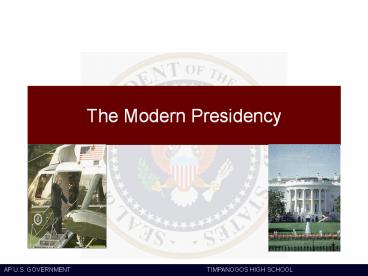The Modern Presidency - PowerPoint PPT Presentation
1 / 30
Title:
The Modern Presidency
Description:
The Powers of the Presidency Have Grown Substantially in Modern Times... Cheney's Law. AP U.S. GOVERNMENT TIMPANOGOS HIGH SCHOOL. Inherent Powers ' ... – PowerPoint PPT presentation
Number of Views:71
Avg rating:3.0/5.0
Title: The Modern Presidency
1
The Modern Presidency
2
Constitutional Powers and Duties of the President
- The Powers of the Presidency Have Grown
Substantially in Modern Times...
3
Constitutional Powers and Duties of the President
- Many modern presidential are NOT specifically
stated in the Constitution.
4
Constitutional Powers
- Growing Presidential Power
- Broad authority from Congress
- Public Opinion.. Executive FIRST BRANCH of
Government - Inherent Constitutional Powers
- Power Crises emergencies
5
Constitutional powers
- Executive powers
- Diplomatic powers
- Legislative powers
- Military powers
- Judicial powers
6
Executive Powers
- Basic role of the President is to execute or
carry out the law. - The executive power shall be invested in a
President of the United States of America. (Art
II, Sec 1, p 1) - he shall take Care that the Laws be faithfully
executed (Art. II, sec. 3) - This is one of the most elastic phrases of the
Constitution.
7
Executive Powers
- I have used every ounce of power there was in the
office and I have not cared a rap for the
criticisms of those who spoke of my usurpation of
power... I believe that the efficiency of this
Government depends upon its possessing a strong
central executive - Theodore Roosevelt, 1908
8
Executive Powers
CASE STUDY Little Rock Nine
9
Executive Powers
- Presidents can invoke Executive Privilege on
matters of national security. - U.S. v. Nixon (1974)
10
Legislative Powers
- Legislative powers include
- Veto power
- State of the Union Address
- Budgets
- Expected to lead
11
Legislative Powers
- The Veto power
- The only expressed legislative constitutional
power.
12
Legislative Powers
- Presidents use the OMB to submit budgets to
congress
2010 Budget Proposal
13
Diplomatic Powers
- Head of State
- Treaties with Foreign nations
- Requires the Advice and consent of the Senate
14
Diplomatic Powers
- Executive Agreements
- Recognition
15
Judicial Powers
- Nominates Federal Judges
16
Judicial Powers
- Grant pardons for federal crimes
- Ford Pardons Nixon
- Audio
17
Military Powers
- The President shall be Commander in Chief of the
Army and Navy of the United States (Art. II, Sec
2, par 1) - The Presidents role as Commander in Chief is
perhaps his most vital.
18
Executive Inherent Powers
- In-depth
19
Executive Powers In-Depth
- Presidential Directives
- Most common are Executive Orders
- Have the force of law
- Can be challenged / reversed
- National Security Directives and findings
20
Executive Powers In-Depth
- Japanese Internment
- FDRs 1942 E.O. 9066
21
Executive Powers In-Depth
- Clinton signs an executive order on the rim of
the Grand Canyon - Executive orders , in theory at least, are
supposed to be based on existing statute. - The so called Antiquities Act of 1906 was the
basis of Clintons federal land grab in Utah.
22
Inherent Powers
Cheneys Law
- Presidents have claimed so called inherent
powers. Today, these claims include - Domestic eavesdropping
- Capture and Render terror suspects
- Enhanced interrogation
23
Inherent Powers
- There were a powerful set of shared assumptions
that we had in the wake of 9/11, and one of the
most powerful was the assumption that we would
never be forgiven if we failed to do something
that was within the power of our government
lawfully to protect the public from a further
attack - Bradford Berenson, Associate White House Counsel
To President Bush
24
Inherent Powers
- In Nov. 2001, President Bush issued a finding
dealing with terrorists.
25
Inherent Powers
- John Yoo, Memo (9/25/01)
- The President has broad constitutional power to
take military action in response to the terrorist
attacks on the United States on September 11,
2001. Congress has acknowledged this inherent
executive power in both the War Powers Resolution
and the Joint Resolution passed by Congress on
September 14, 2001. - The President has constitutional power not only
to retaliate against any person, organization, or
State suspected of involvement in terrorist
attacks on the United States, but also against
foreign States suspected of harboring or
supporting such organizations. - The President may deploy military force
preemptively against terrorist organizations or
the States that harbor or support them, whether
or not they can be linked to the specific
terrorist incidents of September 11.
26
Inherent Powers
- to use all necessary and appropriate force
against those nations, organizations, or persons
he determines planned, authorized, committed, or
aided the terrorist attacks that occurred on
Sept. 11, 2001, or harbored such organizations or
persons, in order to prevent any future acts of
international terrorism against the United States
by such nations, organizations or persons.
27
Inherent Powers
28
Finis
- Jump to Organization
29
Executive Powers In-Depth
- In May of 2003 the White House issued Executive
Order 13303 that took control of all oil
reserves in Iraq. - Some feel the use of executive orders have
exceeded the constitutional authority of the
president.
30
Inherent Powers
- Some feel the expansion of presidential power has
exceeded the constitutional designs of the
office




























![Download Book [PDF] Presidential Power and the Modern Presidents: The Politics of Leadership from PowerPoint PPT Presentation](https://s3.amazonaws.com/images.powershow.com/10051528.th0.jpg?_=20240610012)

